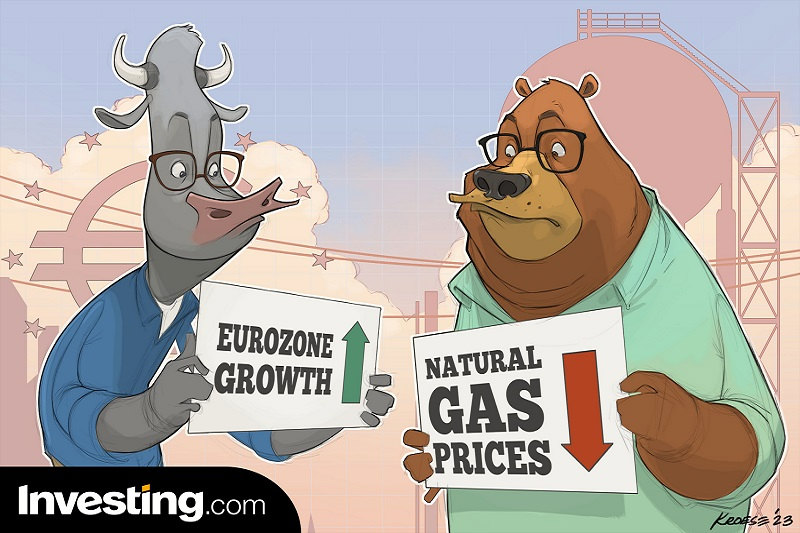German construction sector still in recession, civil engineering only bright spot
By Geoffrey Smith
Investing.com -- All of a sudden, things are looking up in Europe. Well, relatively speaking, at least.
First, the good news. The energy-driven disaster that threatened to hit Europe 11 months ago when Russia invaded Ukraine has failed to materialize, through a combination of political resolve, economic necessity and sheer good luck.
Surging prices and collapsing confidence have led Eurozone and U.K. industry to cut back sharply on their use of natural gas – factory demand was down 25% in December in Italy, and down 32% in Germany, according to estimates from the Brussels-based think-tank Bruegel. A prolonged spell of warmer-than-usual weather has suppressed household demand across the continent – albeit at the cost of wrecking the skiing season.
Europe is now past the midpoint of what the gas industry considers the heating season, and its storage facilities are still – astonishingly – 74.8% full, above the top end of the range seen in recent years. Benchmark futures for natural gas in northwest Europe have slumped to their lowest since September 2021 this week, as traders and regulators alike have written off the risk of a gas crisis.
All that is reflected in the (admittedly not perfect) S&P Global purchasing managers index for the Eurozone, which this week for the first time since July nudged above the 50 line that typically signals growth.
True, the European Central Bank had already anticipated much of this in December, when it raised its growth forecast for this year to a (still-anemic) 0.5%. JPMorgan analysts now estimate it may be as much as 1.0%, not far below what analysts consider to be its medium-term potential.
The economy is getting tailwinds from important sources: Eurozone governments have implemented support measures equivalent to 1.6% of Eurozone GDP in their budgets for the coming year, according to ECB estimates - mainly in the form of energy subsidies. Additionally, China’s reopening will revive demand for Eurozone export goods and – barring disasters – remove the remaining supply chain bottlenecks that have plagued European industry for the last three years.
But if that all sounds too good to be true, well, it probably is.
Take those gas prices, for example. At €55 (€1 = $1.087) a megawatt-hour, that’s still more than three times what it averaged in the years before the current crisis, and threatens to make a wasteland of Europe’s remaining energy-intensive industry if it is sustained. That price translates to over $17.5 per million Btu – over six times what U.S. industry is paying at the Henry Hub.
European industry’s ability to stay competitive at those levels must be seriously doubted. Output from that sector in Germany was down 12.9% from a year earlier in November, and BASF (ETR:BASFN), its largest chemicals company and one that embodied Germany’s dependence on cheap Russian gas, has already warned of having to drastically scale down operations in its home country.
Then there is the nature of that fiscal support. Faced with last year’s emergency, Eurozone governments borrowed from future years to smooth out the expected slump in output due to the war. While that’s a perfectly legitimate aim, it means that the Eurozone can expect fiscal policy to act as a drag on output from 2024.
Then there’s the slowdown in the U.S. and the U.K. which together took nearly three times as much in Eurozone exports as China in the last year before the pandemic. A British economy floundering in the post-Brexit mess will simply not absorb the same level of Eurozone goods as it did before.
Nor has Europe finished cutting itself off from cheap Russian energy. While it has dialed down imports of coal, crude oil and natural gas to nearly nothing, it still has to take the final step of banning imports of Russian refined products – specifically diesel. While some analysts see the oil market as able to contain any price shock from that move, which comes into effect next week, no one is expecting it to make the indispensable fuel for much of heavy industry and transport cheaper in Europe.
Which brings us back to the war in Ukraine. It remains the case that the conflict has forced Europe to embed all manner of higher costs in its economy. As of this week, with the U.S. and its western allies agreeing a major shift of policy to include heavy armor in their next aid packages, the prospect of that war and its associated economic dislocations dragging on for longer has arguably increased (as has – arguably – the risk of it being ended all too quickly by a Russian nuclear strike).
All of which means that the European Central Bank will have to live up to its threats to keep tightening monetary policy, lest the inflationary genie escape. December’s ECB meeting was notable for a clear shift in the bank’s rhetoric on pipeline inflation pressures and the risks of ‘second-round effects’, where consumers try to make up for lost purchasing power with higher pay raises, driving a new round of inflation. Even the ECB’s arch-dove chief economist Philip Lane has warned since then that the ECB will have to be on its toes for years rather than months about the consequences of last year’s inflation surge.
So two cheers for the Eurozone – the worst has probably been avoided, but the best likely scenario is still not much to get excited about.
